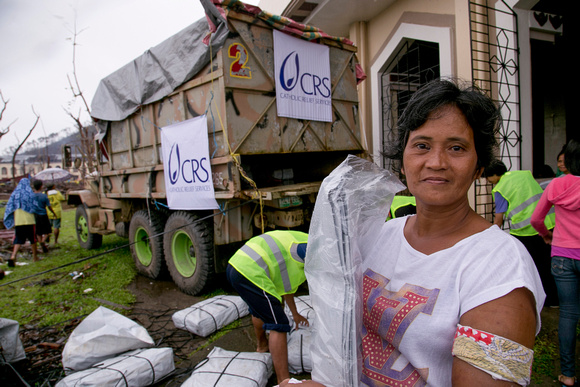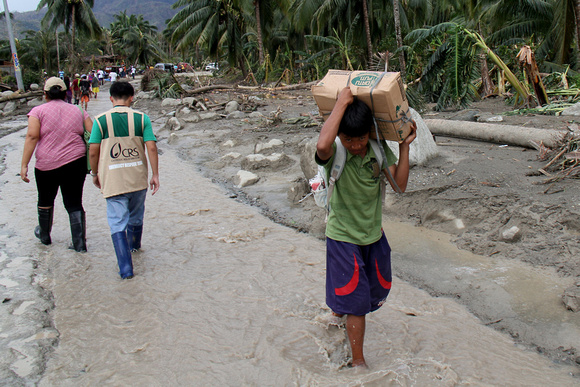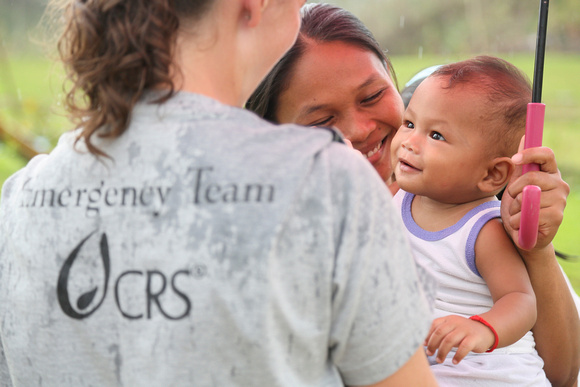Carolyn Woo of CRS Previews Pope Francis's New Encyclical

ROME — As one of the encyclical presenters for the Vatican, Carolyn Woo, CEO of Catholic Relief Services, the international development and relief agency of the U.S. Catholic bishops, knows what’s coming with Laudato Si: On the Care of Our Common Home. What she sees is a game-changer in the discussion on climate change and man’s impact on the environment.
The Vatican’s press office announced Monday that Woo will be one of four presenters when the Pope Francis’s encyclical is rolled out on June 18.
Speaking with the Register by phone from Rome, Woo speaks about the role private enterprise and individuals can play in addressing climate change, where multiple man-made factors may be at play beyond just carbon emissions. She also addresses the concerns some Catholics have that the climate change discussion could be opted by anti-life ideologies, and why Catholics need to join the Pope in taking ownership of this issue.
Why were you chosen to be one of the presenters?
God has a sense of humor. My background is that I was dean of the business school at Notre Dame for 14 years. During that time, my theme really was “business for good.” And I focused on different dimensions: a dimension of ethics, ethical cultures, and ethical contributions to society. So I’ve worked on these issues from the business end for a while. Now I’m at CRS, working in development and relief, and I actually have seen the flipside of how people live and how they suffer. I’ve seen the dangers and the exposures that they face with this climate crisis. So I’ve seen both ends.
Why do you think having a business perspective is important for the Vatican?
I think it’s good to have an American business person, just because there’s so much American businesses can do. You know, with this call to action, the two big countries, China and the United States, must provide leadership on this whole climate issue. And businesses can actually take a major lead in that response. There’s a lot that businesses can do to manage their supply chain: with their use of energy, the design and production of products, financial services and how they reach the poor — or fail to serve, or do serve, the poor. Businesses have a very big role.
Even more, they can enable a consumer to consume properly based on the way they deliver goods, and be thoughtful and comprehensive about the other stakeholders, beyond just profit and shareholders. So I think it’s really important to have someone to address the business sector. It must be part of the solution, [companies] are big actors with lots of potential.
I think the irony is that I’m an American citizen, but I’m from Hong Kong, so I reach a lot of different categories, but in the end it’s really the Holy Spirit. I’m so humbled, and so excited, to have a role in this. It’s not because of me per se, it’s just that this is a work of the Holy Spirit.

How much of a game changer do you think the Pope’s encyclical might be?
Oh pervasive, and for multiple reasons … I think for American society as a whole, the majority don’t think that there is a climate crisis. But the Pope is such an authority figure — he has no agenda. He has nothing to gain by calling it a crisis, if it’s not a crisis. So I think the credibility of the Pope will have extensive influence in every country. You can see too that he was not using this particular encyclical to just speak to Catholics. He’s speaking broadly to everyone. … I think his credibility is going to get the attention of people who are sitting on the fence.
And I think people will take note to not close their hearts to this particular issue. I think [the encyclical] is not only to get people’s attention, but to open people’s hearts.
There are a lot of people who are leery that talking about man-made factors in climate change will provide cover for population control groups and similar ideologies. How do you address those concerns and explain why we Catholics have to be part of the conversation?
I think people are confusing two things. One is: “Is there a problem?” The second is: “What are the tools that certain groups see as the way to solve the problem?” That tool [population control] is unacceptable to us — we don’t think there is a lack of abundance for people. We think there is a misuse of resources. We need to enter into this climate dialogue, because it’s about intergenerational justice. If you really care about your children and grandchildren, you need to look ahead and ask yourself what you are passing on to them.
I think there is this confusion because a tool is unacceptable for us, we therefore “cannot talk about the problem.” Whereas [climate change] actually has a lot of solutions, and the Catholic approach has never accepted that tool [of population control].
So, people are afraid that this discussion is the entry for this whole “population control” idea, which is so distasteful to us. They say, “We don’t want to provide any occasion for that idea to be made!” and so refuse to acknowledge the problem.

How do you deal with that?
We’ve dealt with population control as the [proposed] solution for things for many years — 40 to 50 years! That has not gone a whole lot of places. It used to be claimed that the whole “food scarcity” in the 1960s was because of too many people, and then that turned out to be not the problem. Population control is not the solution, the solution was actually human ingenuity to increase productivity. Proper actions actually could prevent further damage and destruction that can diminish the supply.
So, we have to separate these things, and ask ourselves “is there a problem?” and if there is a problem, we have to acknowledge the problem.
There are many different approaches, many of which can work together. Population control is not our vision of the world; it is not at all our approach. So it will stand or fall on its own merit. But meanwhile, we do have to take on a real problem, particularly if we really believe in the sanctity of life. If there’s no water and agriculture production, because it has completely destructed, that’s a problem!
.jpg)
Are man-made factors in climate change just a matter of increased carbon dioxide [CO2] in the atmosphere, or is it more than that?
It’s not just CO2. For example, misuse of water is another thing. If you take a lot of water out of the ground, how do you recycle it? Do you really need to dig that much water out of the ground? Another area that is not CO2 is the way we consume: we’ve taken away lots of natural resources, and along the way we’ve terminated different species and plants and animals. The whole biodiversity crisis is related much more to consumption and production. So there are multiple factors and the Pope tries to get at all of them.
It’s a complex problem. What can we actually do?
I would say it’s a complex problem, but with simple steps. Not simple solutions, but I think each one of us can ask ourselves what is the part we can do: just as a regular person or household? There’s a lot of our habits, for example, which can be made toward conservation. We can ask ourselves, what do we want to do as a consumer? How do we want to mold our social habits? Specifically, what type of accountability do we seek for our major purchases?
So, it is a complex problem, but the good thing is that there’s so much anyone can do, or any institution, business or government. There’s not a lack of things to do to improve this. I think the Pope’s encyclical is going to make an impact, because he’s going to speak to those people who say, “perhaps it is not a real problem.” The Pope has said this is a real problem. The second thing is that some people say, “what can I do about [climate change], because I’m surely not the one who created the problem!” Well, the encyclical basically says that everyone can do a lot for it.

- Keywords:
- carolyn woo
- catholic
- catholic relief services
- climate change
- crs
- environment
- environmental encyclical
- global cooling
- global warming
- laudato si
- man-made climate change
- peter jesserer smith
- pope francis
- vatican















